Travel in Asia: A Guide for First Time Visitors
By Amelie de Mahy
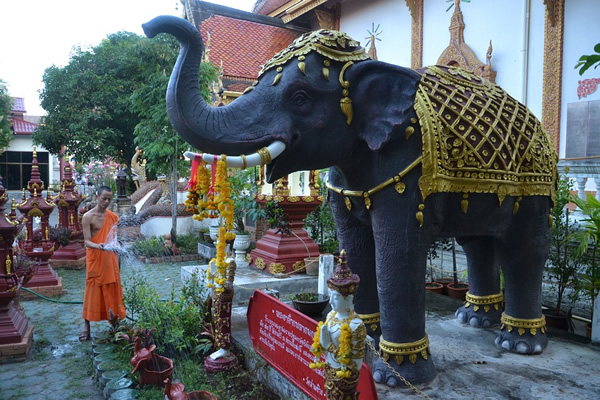 |
| A monk watering plants at a temple complex in Chiang Mai, Thailand. |
For most individuals contemplating travel in Asia, a palpable fear accompanies the desire. Many travelers' tales involve nightmare scenarios. Such descriptions often unnecessarily frighten the prospective visitor since they offer no practical ideas for preparing for a trip. Although travel in Asia is challenging, it is usually relatively easy in practical terms and exceptionally rewarding. The many possible levels of physical comfort when traveling throughout the most popular areas in Asia are up to you.
To prepare for a trip to Asia, you may choose to bring a variety of items, but only three are absolutely essential:
-
A passport with the necessary visas
- A ticket
- Money
Passports and Visas
Most passports can be applied for at your local Post Office. In addition to the application, you will need proof of citizenship (e.g., a birth certificate), an I.D. picture, and two passport photos. Your passport will take about 6-8 weeks months to arrive, so plan ahead. Those needing passports in a rush can expedite the process to about 2-3 weeks for an additional $60. You can apply for visas in your home country, the overseas embassy of the country you wish to visit, or through overseas travel agencies. Several countries issue visas upon arrival, so you must check the policy of those you plan to visit. Those wishing to spend a more extended period than that provided by the arrival visa may want to apply for their visa from their home country; longer-term visas are also often available.
Air Flight Tickets to Asia
Through the web, hunting for the best ticket prices and setting up the itinerary for your trip in Asia has become quite simple. The major sites used for domestic travel are also helpful in browsing for the best international flight fares. AirTreks offers round-the-world tickets, and you can customize your own trip. Tourist areas in most major Asian cities are teeming with travel agencies that supply needed air, boat, bus, and train tickets. Visas are yet another service offered by travel agencies throughout Asia.
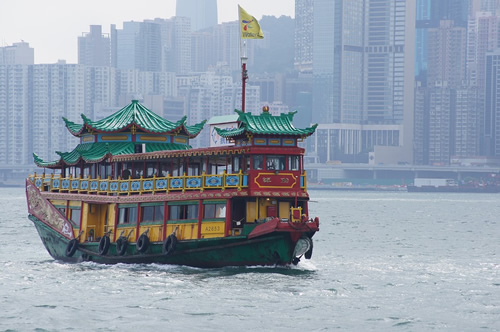 |
| A boat ride in Hong Kong. |
Money
ATMs are available in most areas and are an easy way to access the bulk of your money — though losing your card is the risk you take. Traveler's checks are a safe option but tend to yield a much lower exchange rate than their cash equivalent. It is always handy to keep some American money in cash in case of emergencies. Some areas with lower-valued currencies and high levels of tourism, like Siem Reap and Cambodia, use U.S. dollars.
Many budget travelers (aka backpackers) still earn $35-$45 a day on average, depending on the countries visited. The costs can very quickly escalate. Laos, Cambodia, India, and Indonesia are primarily on the cheaper side, while the Maldives are very expensive. Taiwan, Japan, South Korea, and Singapore are also quite costly. Formerly inexpensive areas, prime destinations for budget travelers, have been bought up by increasingly upscale businesses, pushing prices up. Koh San Road, a popular street amongst backpackers in Bangkok, Thailand, is now seeing chain stores and restaurants replace locally owned businesses. Thamal in Kathmandu, Nepal, and the main bazaar in Delhi, India, have suffered the same fate. Travelers interested in staying in these areas may find better deals when looking to the outskirts. Many first-timers choose to remain in these areas due to Western conveniences and comforts other parts of town do not offer. Still, more seasoned and adventurous travelers usually gravitate towards off-the-beaten-track areas.
A quick glance through a guidebook, or better yet a crowdsourcing site like Numbeo, which offers cost-of-living averages, can often provide ideas about the types of guesthouses, hostels, and food prices that represent the bulk of daily money spent. As tempting as many high-end restaurants and hotels in Asia can be, they likely will immediately eat up your budget. Areas catering to families and honeymooners should be avoided. They are often rich in Western comforts that come at a hefty price.
Clothing in Asia: Be Modest and Minimalist
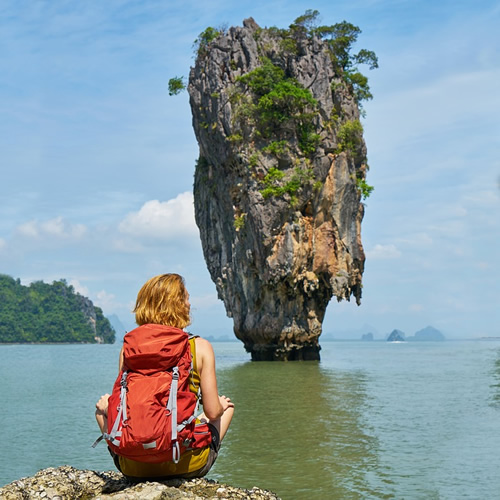 |
| A backpacker gazing at an unusual rock formation in Thailand dressed to be comfortable. |
Pack very light, as you will spend much time with these items strapped to your back. Clothing and shoes can be found in most urban areas in Asia. Many stores cater specifically to tourists and stock popular items seen only by fellow travelers. A few pairs of shorts and pants and a few shirts are all you need for most of Asia. The climate in Southeast Asia and much of India tends to fluctuate from being extremely hot to very comfortable. Northern India and Nepal — due to their altitude — can become quite cold, if not outright freezing, during the winter months.
You need warm clothing to head into the mountains regardless of your travel season. hose hiking in Nepal will need coats for at least part of their trip. The quantity of apparel necessary varies depending on the elevation level of the hike. Some hikes take place at relatively low altitudes. Warm-weather items and hiking gear can be bought or rented at any store in Kathmandu. Those heading to the mountains of Northern Thailand may need sweaters during the evenings. Travelers interested in heading to Northern India will find warm clothing and shoes at most markets in Manali, a common starting point for those traveling overland.
Most clothing required for travel in a specific country are generally available within the major cities.
Modest dress tends to be preferred in most Asian countries.
Major tourist destinations are exceptions. You will not see full-coverage swimsuits on the famous Thai beaches. Within India, modest clothing is the only way to dress, especially if you are a woman. Traditional Indian clothing for women can be bought or tailored. These outfits are incredibly comfortable and receive less attention than Western clothing.
Vaccinations
Necessary in Asia
There are often questions as to what vaccinations are required when traveling in Asia. Before the pandemic, you did not need specific immunizations to enter any Asian country. Currently the CDC and WHO recommend the following vaccinations for travelers to East and Southeast Asia: hepatitis A and B, typhoid, cholera, yellow fever, Japanese encephalitis, rabies and polio. Some travelers will receive every suggested vaccination, while others will travel without incident with none whatsoever. Out of the long list of available vaccinations, those for hepatitis A and B and well as typhoid should be most seriously considered. In addition, make sure booster shots are up to date. Research and note any local warnings for the areas you will visit on your own government website, such as the CDC. Malaria pills garner much the same debate as vaccinations. It would be best to weigh the risk of possible side effects with the malaria intensity level of the areas you visit.
If you go to Asia, get all the vaccinations your doctor recommends before your trip and take your malaria pill dosage as directed. Some people advise you to spray down your clothes before the journey with mosquito and tic repellent such as Permethrin f you plan to hike or go into tropical areas, which are everywhere in Vietnam, Cambodia, Thailand, and elsewhere in SE Asia. Many use DEET for their exposed skin to protect against mosquitoes and ticks. You don't have to use the above, but many regret not doing so or maybe worried during the trip if they have not maximized protection.
Whatever vaccinations and treatments you use are obviously your choice. You should consider all the pros and possible cons very carefully. Some people are more comfortable playing with fire than others.
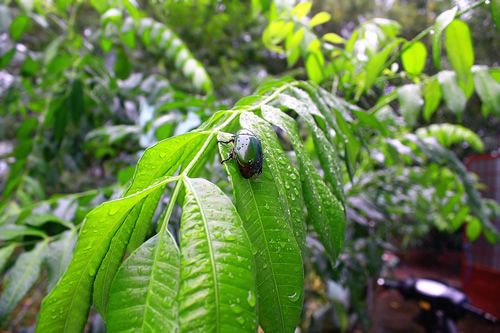 |
|
Yes, there are bugs in Asian jungles. Be prepared, you will be fine.
|
Health Advice for Travelers in Asia
Another huge concern for prospective travelers is getting sick while abroad. If you do get sick, it can be traced back to two things: food and water. There are common-sense things you can do to minimize your chances of getting sick, including cutting down on meat in certain countries, drinking only bottled water, and peeling fruits and vegetables. Despite the best efforts, few make it out of Asia without some stomach upset. Remember that every traveler is likely going through the same experience — making the event seem less dramatic than initially imagined. There are pharmacies in nearly every town. You will not be the first tourist they have seen with stomach problems.
Shopping and Bargaining in Asia
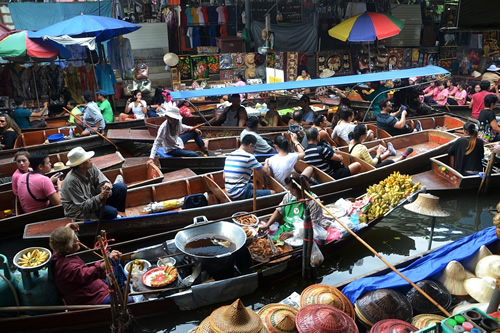 |
|
A floating market in Vietnam.
|
My travels in Asia have led me to a few observations that — like all generalizations — are certainly subjective and often contradicted by notable exceptions:
-
A sight witnessed just as often as food poisoning is the irate traveler upset by a local trying to sell or overcharge for goods or services.
-
Battles waged on principle, sometimes over a few cents, waste time and energy.
-
It would be best if you learned to assert yourself without becoming easily agitated. Scams are certainly not uncommon.
-
Do not hesitate to walk away or say no if a situation seems strange.
-
You should be skeptical if you are told something is free, as few things are. Donations are usually expected.
-
You will soon learn to recognize how local people interact daily in Asia's various and varied countries.
-
Try to respect the customs and practices of the local people hosting you.
Immersion travel in a foreign culture can often seem overwhelming, especially for a first-timer. Knowing how to prepare and what to expect is one way to assuage persistent fears. In the end, most first-time travelers to Asia find themselves stretching far beyond the limits of what they believed they were capable. The experiences of travel in Asia are transformational.
AMELIE DE MAHY is from Lafayette, LA.
|
